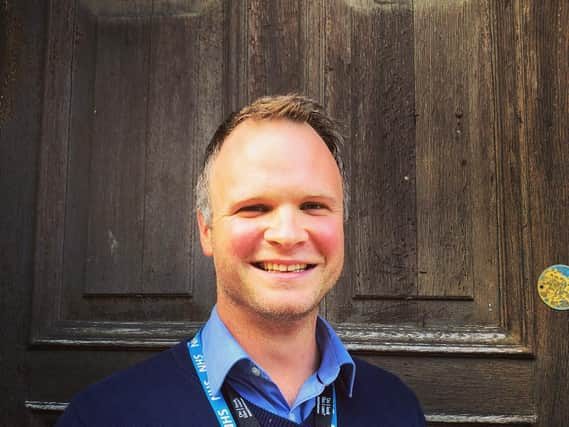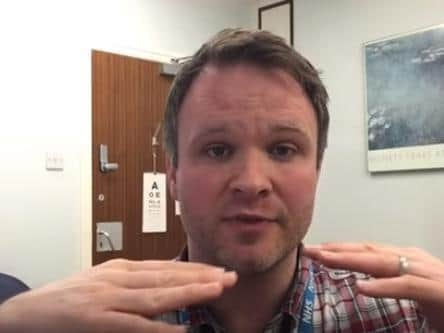Carnforth GP on returning to work after recovering from coronavirus and NHS England backing for his 'Difficult Conversation' video


"The first experience I had with coronavirus was trying to do the Joe Wicks workout with the kids...I just couldn't do it."
Dr Knox, 39, thought he'd overdone the popular online kids' workout videos the week before, but quickly realised it was more than just fitness fatigue.
Advertisement
Hide AdAdvertisement
Hide Ad"I was breathless and just thought I'd become unfit," he said.
"I was aching all over.
"I had a high temperature during the night, feeling generally unwell, and the next morning it felt like I'd been hit by a bus.
"I spent most of my time in bed for the two days following, and my mouth was incredibly sore, red and covered in ulcers.
"I couldn't really talk - that's how my family could tell I was definitely ill!"
Advertisement
Hide AdAdvertisement
Hide Ad

The father-of-three returned to work at Stoneleigh Surgery, in Milnthorpe, on Monday, April 20, after self-isolating with the disease for the best part of two weeks.
His family also had to isolate after his younger two children had very mild symptoms a few days after Dr Knox, mainly a bit of a temperature and being off colour.
"That's quite a common experience," he said.
"It's possible they've had coronavirus without really having the symptoms.
"The other thing that happened to me was I completely lost my sense of taste and smell, and this lasted for four or five days.
Advertisement
Hide AdAdvertisement
Hide Ad"I was eating a bit - and making sure you do eat is really important when you're unwell - so it was things like fruit and vegetables, and I took Vitamin C and Iron supplements with fresh juice."
The GP moved his practice to Milnthorpe when Ash Trees Surgery, in Carnforth, and Stoneleigh Surgery, in Milnthorpe, merged this month.
"The worst symptoms lasted two days," he said.
"My energy levels took a bit longer to pick back up.
"I just rested, and probably in under a week I was back to fighting fit.
"A lot of people are saying watch out for a 'double dip' - that's when the symptoms come back after seven or eight days and you're feeling rough again.
Advertisement
Hide AdAdvertisement
Hide Ad"This didn't happen for me, but there is evidence that there can be a second wave of it.
"I didn't need anything more than paracetamol, and the equivalent to Lemsip, and I also used an anaesthetic spray on the back of my throat, which you can get over the counter.
"It's very similar to influenza in terms of symptoms, perhaps not as severe in terms of the exhaustion and aching body.
"The thing that people need to look out for is the shortness of breath, and a high temperature.
Advertisement
Hide AdAdvertisement
Hide Ad"A couple of my colleagues have had it, and I'm pretty sure I caught it within the practice."
As well as practising as a GP, Dr Knox is also Director of Population Health at Morecambe Bay Clinical Commissioning Group (CCG).
Within this role he has released a series of videos aiming to educate people on coronavirus, including A Difficult Conversation about COVID-19, where he discusses how families might deal with family members or loved ones testing positive or falling ill as a result of COVID-19.
The video is now being used by Clinical Commissioning Groups across the country as a model for other doctors.
Advertisement
Hide AdAdvertisement
Hide Ad"It's one of the hardest parts of a doctor's job to talk about death," he said.
"It's certainly not easy, but it's so important.
"I was very moved by people who called up and said this has helped them to focus.
"Someone with a terminal illness said it helped them to have the conversation with their children.
"A lot of doctors have said that they don't want to just 'cold call' people, and that a video would be really useful to help them help others.
"We're certainly not trying to coerce anyone into anything.
Advertisement
Hide AdAdvertisement
Hide Ad"I had a message from the Chief Executive of Age UK in Lancashire who thought the video was very compassionate and helpful.
"NHS England has also recommended it to be used nationally, and other CCGs have asked if they can use it to help their patients.
"I was never looking for controversy, and I recognise that it might be hard for someone seeing that, but that is part of the complexity of being in a global pandemic.
"If we don't have these conversations, we do a massive disservice to the public at large and to each other."
Advertisement
Hide AdAdvertisement
Hide AdDr Knox, who first became a GP in Manchester 12 years ago, and then moved to Ash Trees Surgery in 2012, said that one of the things that had struck him most about the coronavirus pandemic was the power of community.
"One of the most moving statements for me was when Boris Johnson said the NHS is fuelled by love," he said.
"There's been an overwhelming show of appreciation for me when I became ill, and also a show of kindness with donations to foodbanks, and also neighbourliness.
"It's given us humility, and a sense of mortality and that life is fragile.
Advertisement
Hide AdAdvertisement
Hide Ad"More than anything in recent history it has focused our minds on the fact that all of us will have to face up to difficult situations at some point, and the fact that all of us will die, and that's why we're having to have challenging conversations with the community so that we can all make positive choices.
"I've looked after many people over the years and there is always the question about what kind of care they would like, and what's important to them.
"I think COVID-19 is going to change things fundamentally in terms of how we think about and deliver healthcare.
"We're phoning all our patients up who are vulnerable to talk through things with them, as that is our role as GPs, but what we're now finding is people are contacting us proactively for that talk.
Advertisement
Hide AdAdvertisement
Hide Ad"Some are saying 'I don't want to have this conversation now' and of course we won't force people to have it."
Dr Knox said that the pandemic had not peaked in the way it was first thought it might.
He said: "I think that this is down to people taking it really seriously and following the guidance.
"What's really come to the fore is how connected we are to the rest of the world.
Advertisement
Hide AdAdvertisement
Hide AdIf we take no other lesson out of this, it is that we have a symbiotic relationship with the earth and if we don't care for the environment in which we live then that will have a profound effect on our health and wellbeing."
Comment Guidelines
National World encourages reader discussion on our stories. User feedback, insights and back-and-forth exchanges add a rich layer of context to reporting. Please review our Community Guidelines before commenting.